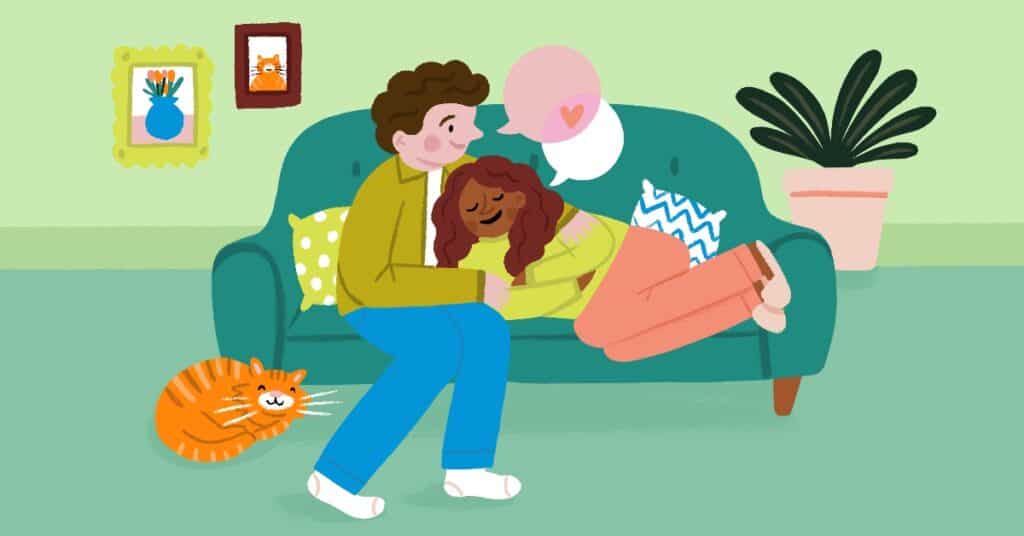
By Cathy Cassata and Brian Wu, MD, PhD
Relationships take work — that’s no mystery. However, if you or your partner live with ADHD, you may face unique challenges.
“Adults who have ADHD, particularly if they have undiagnosed ADHD, often grow up with a lot of shame about wanting to be able to do things or committing to doing things and then having difficulty following through,” says Melissa Orlov, marriage consultant and author of The ADHD Effect on Marriage and The Couple’s Guide to Thriving with ADHD.
Shame is reinforced starting in childhood by people who they respect. That includes teachers, coaches, parents, and friends. As they become adults, that shame makes its way into romantic relationships, Orlov says.
“When they start to disappoint their partner, that shame can easily be triggered,” says Orlov. “They say, ‘I can’t stand to let down my partner or feel like I’m going to fail again.’ Unfortunately, because shame is so hard to deal with, one of the coping strategies is to escape, so there is a lot of shutting out or being defensive. Some move to deny that ADHD is an issue and blame their partner.”
The partner without ADHD can often feel lonely, neglected or unloved.
A 2016 study in the Journal of Child and Family Studies assessed the quality of life of people living with a partner with self-reported ADHD. Participants included 60 Israelis who did not have ADHD, were heterosexual, married and were parents to at least one child. Thirty of those 60 participants were married to a partner with self-reported ADHD symptoms. The other 30 were married to a partner without ADHD. All participants answered an assessment questionnaire to measure their marital satisfaction.
After comparing the two groups of participants, the researchers found reduced levels of intimacy and less marital satisfaction in those who were married to a person with ADHD. There was good news, however: The researchers also found the couple’s degree of intimacy could offset the negative effects of the ADHD symptoms.
How symptoms of ADHD impact relationships
Industry experts estimate that about 80% of adults who have ADHD are not currently diagnosed or don’t know that they have it, says Orlov.
“The symptoms are there, but there is no name for them, which makes it confusing,” she says. “Partners might also misinterpret ADHD symptoms, particularly if you don’t know that your partner has ADHD.”
The following symptoms have the biggest impact on relationships, says Orlov:
• Distractibility
Chronic distraction involves flipping from one thing to another and finding it difficult to stay on task or initiate tasks.
“One of the common side effects is that the person with ADHD is distracted from their partner and has trouble paying attention to their partner,” says Orlov. “So people who are married to those with ADHD report feeling lonely or ignored or unloved because their partner is so distracted.”
Distractibility can also force the person without ADHD to take on more everyday responsibilities like household chores or parenting tasks to compensate for the ADHD partner’s inconsistency.
“While that often starts out as a generous contribution to the relationship, eventually it almost always builds up resentment and anger because the person is carrying too much,” says Orlov.
• Difficulty completing tasks or being on time
If a partner promises to do something but gets distracted from it, forgets about it, has trouble initiating it or finishing it, that can erode trust and accountability in the relationship. Especially if it happens over and over again.
“The person who has ADHD wants to do those things, but then the symptom gets in the way of completing or doing it,” says Orlov. “This reinforces the negative interaction where you say, ‘Yes, I want to do this’ or ‘I’ll do it’ and then it doesn’t happen. So the ADHD partner is seen as consistently inconsistent, which puts a lot of pressure on the relationship because you expect that your adult partner will be able to follow through on the things they want to follow through on.”
• Impulsivity
Impulsivity refers to acting without thinking first. It involves the inability to slow down enough before acting and instead doing whatever suits you in the moment. Orlov says impulsivity can make partners feel unheard or not listened to.
A 2017 study in the Journal of Attention Disorders evaluated two groups: romantically involved young adults and romantically involved young adults with ADHD. Participants in both groups reported on their levels of inattention and hyperactivity-impulsivity, their relationship maintenance activities and their relationship quality.
Researchers found that inattentive symptoms were associated with greater interest in alternatives outside the relationship — including not remaining monogamous — and less constructive responses to a partner’s bad behaviors. Hyperactive-impulsive symptoms were associated with negative responses to bad behavior.
Orlov says impulsivity in a person with ADHD can show up in a relationship in a number of ways.
“One is sometimes people (impulsively commit to something) that they either discuss with their partner and decide not to do, but then do anyway. Or they don’t discuss with their partner and just do,” she says.
A person might also display verbal impulsivity, in which they interrupt their partner often. Or they say things that, if they didn’t have ADHD, would have given more thought to before saying.
Other extremes examples of impulsivity might include the inability to stop spending money, notes Orlov.
“The ADHD brain doesn’t have enough dopamine, which is part of the reward system. So its impulsive actions are not only about poor impulse control, but also about adding dopamine,” Orlov says. “In this case, the spending reward feels good.”
How to improve your relationship
Both partners must put forth effort in a relationship, and it’s no different when one person has ADHD.
“The classic mutual stance when people start to learn about ADHD is that the non-ADHD partner says: ‘If you would only fix the ADHD, everything would be fine.’ And the ADHD partner says: ‘If you would just stop being so angry and mean to me, everything would be fine,'” Orlov says. “Of course, both are issues in the relationship, but it’s about each partner taking on what they are contributing and dealing with the symptoms, dealing with the anger, and dealing with the loss of hope.”
She suggests the following ways to help improve your relationship.
• Get educated about ADHD
Learning about what ADHD is and how the symptoms manifest can help both people understand how it impacts the relationship.
“It’s life-changing for many couples to realize that what is going on between them is actually part of the ADHD and responses to ADHD,” says Orlov. “Once they understand ADHD, they can create strategies to implement.”
For example, after learning that distractibility is an ADHD symptom, a person might learn to accept that if their partner isn’t paying attention to them, it doesn’t mean they don’t love them.
To address the issue, Orlov suggests saying something like, “You know, this week, you’ve been particularly distracted. How about if we go out on a date?”
“This way you get the attention you need in a positive way and don’t have it turn to resentment or anger,” she says.
• Find ways to treat and manage ADHD
When the person with ADHD seeks treatment and learns management techniques for their condition, it can significantly help the relationship.
“This does not mean just medication, which is effective, but it’s more than that,” Orlov says. “Once the person can get in control of their ADHD and is more reliable, it’s easier for the relationship to start to heal.”
People with ADHD also need to become aware of how hard it is for their partner to deal with ADHD symptoms, she adds.
At the same time, the partner without ADHD needs to be empathetic in terms of how challenging it is to have and manage ADHD, as well as be more aware of their responses toward their partner and work on effective reactions.
This might include “looking at their own anger, hopelessness, depression or parenting behaviors, where they are managing too much, not setting good boundaries, etc.,” says Orlov.
• Seek out professional help
Finding a therapist who treats ADHD with cognitive behavioral therapy, especially for those with co-existing anxiety or other mental health conditions, is crucial, says Orlov.
A study published in the journal Cognitive and Behavioral Practice found that couples who underwent integrative couples therapy reported fewer ADHD symptoms and better marital satisfaction.
If couples want therapy together, Orlov suggests they put time in to find a therapist who understands how adult ADHD impacts relationships.
Her best advice to couples she works with through her seminar — The ADHD Effect In-Depth — is to focus on the things they most want to get out of the relationship and make sure they are getting those things. Then they must learn to be flexible with everything else.
“They can get into this battle, which superficially looks something like ‘You don’t get household tasks done,’ when really it’s about much deeper emotional issues like wanting to be seen and heard and attended to, and appreciated by their partner,” says Orlov.
ADHD and the typical symptoms that come with it can put a strain on a marriage and even increase the risk of divorce. However, ADHD marriages can be healthy and successful. Therapies like integrative couples group treatment can help to improve relationships and teach couples ways to cope with the challenges of ADHD in everyday married life.
Sources:
Journal of Child and Family Studies
Journal of Attention Disorders
ADHD & Marriage: ADHD Effect In-Depth seminar
Get a formal evaluation and treatment if needed: You can learn more about how ADHD Online provides a formal evaluation of your symptoms from our network of doctorate-level psychologists. We also offer treatment options if you’re diagnosed with ADHD.






